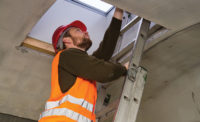Women have made amazing strides in many fields and industries throughout the 20th and 21st centuries. Unfortunately, there are many others in which it remains a big challenge for a woman to rise to the top — or even, in some cases, to enter the industry at all. Construction has traditionally been one of those industries, with just 9 percent of the construction workforce composed of women.
It’s true that the obstacles for women in the construction trades are numerous. Some obstacles are big: Sexual harassment is still all too common on job sites, and women often aren’t taken seriously when applying for construction jobs. Some are smaller, but still important, such as the fact that women’s high visibility clothing isn’t always easily available. Put together, all of these factors and more can make it unfairly challenging for women to succeed in construction.
The light on the horizon is that there’s a new generation of resources for women who want to enter the construction industry. From activist organizations to training programs to conferences, there are plenty of ways that women can now leverage the solidarity and resources of other women to succeed in construction and the skilled trades.
Professional Organizations for Women in Construction
Each of these organizations brings women together to fight sexism and establish a safe place for women in the construction industry:
- National Association of Women in Construction (NAWIC): The industry’s oldest and foremost organization for women in the construction industry, NAWIC hosts workshops, holds conferences and publishes its own magazine. They deploy their resources to help their members find new clients, develop key skills, and mentor other women in construction. Women who want to get a college education in the trades should apply to their Founders’ Scholarship Fund that awards over $25,000 per year. You’ll also want to watch out for Missy Scherber, a big WIC advocate who spearheaded Crew Collaborative, an organization that strives to change the landscape of the construction industry.
- Women Construction Owners and Executives USA (WCOE): For women who are involved in the boardroom side of construction projects, WCOE is an organization that can provide great support. They offer access to critical resources such as a database of bid opportunities and discounted subscriptions to industry publications. WCOE is also a formidable lobbying organization that advocates for issues like pay equity and boardroom representation.
- Professional Women in Construction: Women of color can face even greater obstacles in the construction and architecture industries than white women. PWC seeks to change that by advocating for women of color through industry programming, mentorship programs, and a wide network that provides opportunities for leadership and discounted resources. They’re most active in the northeastern states but are always seeking opportunities to expand their network through new chapters.
Training and Development Initiatives for Women in Construction
These initiatives make it easier for women to get the training and professional development they need to succeed in construction.
- Tools and Tiaras: Too often, girls are discouraged from pursuing interests in construction and the trades. The Tools and Tiaras program seeks to change that. T&T offers day camps around the U.S. that provide an introduction to the skilled trades for school-age girls. Community is at the core of the program, and adult women in the trades are encouraged to start their own T&T chapters. The program even offers its own podcast, Tradeswomen Talk, where skilled tradeswomen offer advice about their industries.
- Bridging Outstanding Opportunities with Tradeswoman Skills (BOOTS): The Southwest Regional Council of Carpenters offers this four-week training program for adult women looking to enter the skilled trades. No construction experience is required—only a willingness and desire to learn. The program works with various carpenters’ unions in the American southwest to provide gateways for women to enter union apprenticeships. This structured experience helps set women in construction on the right path to a stable and productive union carpentry job.
- Women in Apprenticeship and Nontraditional Occupations (WANTO): WANTO is a U.S. Department of Labor grant program that helps fund apprenticeships for women in fields where they’re under-represented. The fund helps power a range of new initiatives every year, including programs in Chicago, Wisconsin, and Virginia in 2019. WANTO provides great resources both for women searching for apprenticeship or pre-apprenticeship programs and for women’s advocacy organizations seeking funding for their skilled trades programs.
Conferences for Women in Construction
Women’s construction conferences provide a productive gathering space for women in construction to network, learn, and just enjoy themselves. Note that these programs may be working with alternate schedules or virtual formats due to COVID-19, so check their latest updates before making plans.
- Women in Construction USA: This three-day conference is the U.S.’s premier event for women in construction, with a truly impressive array of speakers who occupy key positions in construction and related industries. WiC USA’s events highlight important trends in construction, such as technological disruption and the critical importance of diversity. From interactive skills development sections to networking opportunities, this conference has it all.
- Groundbreaking Women in Construction: This conference, sponsored by the leading industry publication Engineering News-Record, is focused on leadership and disruptive ideas for women in construction and the skilled trades. GWIC is noted for its no-nonsense panels that cut straight to the heart of the big issues for women in the trades, including tokenism, pay disparity, and LGBTQ issues. It’s an unmissable chance to hear true leaders in the industry talk frankly about the topics that matter most for women in construction. And, of course, it offers top-flight networking opportunities, with over 750 attendees last year from some of the biggest names in the trades.
In spite of the obstacles, women are pushing into the construction industry and making it a more gender-inclusive place. Efforts like the ones we’ve discussed here are crucial, so women who work in construction or want to join the industry should make sure to find time to plug into these resources.



